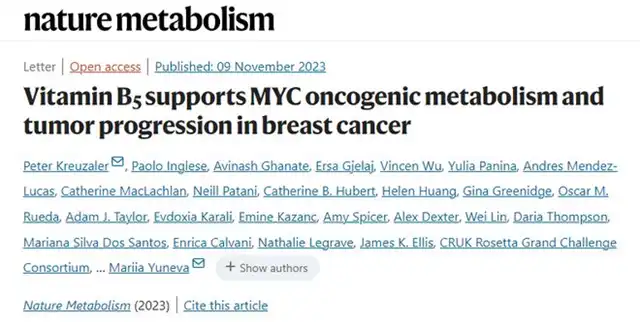Vitamin B5 Found to Promote Cancer Growth
- Normal Liver Cells Found to Promote Cancer Metastasis to the Liver
- Nearly 80% Complete Remission: Breakthrough in ADC Anti-Tumor Treatment
- Vaccination Against Common Diseases May Prevent Dementia!
- New Alzheimer’s Disease (AD) Diagnosis and Staging Criteria
- Breakthrough in Alzheimer’s Disease: New Nasal Spray Halts Cognitive Decline by Targeting Toxic Protein
- Can the Tap Water at the Paris Olympics be Drunk Directly?
Vitamin B5 Found to Promote Cancer Growth, Dietary Restriction Inhibits Cancer Progression
- Should China be held legally responsible for the US’s $18 trillion COVID losses?
- CT Radiation Exposure Linked to Blood Cancer in Children and Adolescents
- FDA has mandated a top-level black box warning for all marketed CAR-T therapies
- Can people with high blood pressure eat peanuts?
- What is the difference between dopamine and dobutamine?
- How long can the patient live after heart stent surgery?
Vitamin B5 Found to Promote Cancer Growth, Dietary Restriction Inhibits Cancer Progression
Vitamin B5, also known as pantothenic acid, a water-soluble vitamin, plays a crucial role in various metabolic processes and energy production in the human body. While most people obtain sufficient Vitamin B5 through a balanced diet, deficiencies are relatively uncommon.
Breast cancer, the most prevalent cancer in women, saw a rapid increase in new cases, surpassing lung cancer as the leading global cancer, with 2.26 million new cases in 2020, according to the World Health Organization’s International Agency for Research on Cancer.
All tumors, including breast cancer, exhibit clonal heterogeneity, promoting their evolution but hindering treatment. The tumor’s metabolism is heterogeneous due to clonal heterogeneity, resulting in a dynamically changing tumor microenvironment characterized by fluctuations in oxygen and nutrient supply.
On November 9, 2023, researchers from the Francis Crick Institute in the UK published a study titled “Vitamin B5 supports MYC oncogenic metabolism and tumor progression in breast cancer” in the journal “Nature Metabolism.”
The study revealed that breast cancer cells with high MYC expression, both in human and mouse breast cancer models, heavily rely on Vitamin B5 for growth and survival. Dietary restriction of Vitamin B5 intake was found to reverse many MYC-mediated metabolic changes and inhibit tumor growth.

In this research, two types of cells with high and low MYC levels were used to create tumors in mice, and human breast cancer tissue was transplanted into mice, including regions with high and low MYC expression.
Mass spectrometry imaging analysis revealed an association between Vitamin B5 and regions with high MYC expression in both mouse and human transplanted breast cancer.
Crucially, this association was also observed in biopsies from breast cancer patients.
Further investigation found that in regions with high MYC expression, the quantity of various Vitamin transport proteins, such as SLC5A6, increased, leading to more Vitamin B5 entering cells and further promoting tumor cell growth.
The researchers suggested that the key to promoting tumor cell growth lies in the crucial role of Vitamin B5 in metabolism. After entering cells, Vitamin B5 is converted into coenzyme A, which is then used in many metabolic pathways, ultimately resulting in increased energy, fat, and protein production, promoting cell growth.
Interestingly, when mice were fed a diet lacking Vitamin B5, tumor growth in both regions with high and low MYC expression was slower compared to mice on a standard diet. This observation was also consistent in human breast cancer tissue transplanted into mice, indicating the critical role of Vitamin B5 in tumor metabolism and growth.

Restricting vitamin B5 intake reduces tumor growth
The researchers emphasized that while Vitamin B5 is associated with tumor growth, considering its vital role in the immune system, restricting Vitamin B5 intake in breast cancer patients requires careful consideration. Currently, researchers are exploring methods to selectively target tumors without compromising the immune system.
The authors noted that many breast cancer patients show poor responses to treatment, and the metabolic dependence of tumors has been explored as a potential therapeutic target in mouse cancer models, showing promise. However, human tumors are much more complex, requiring an understanding of the roles of different genes and the interactions between tumors and human cells to design effective therapies targeting human tumor metabolism.
In summary, the results suggest that breast cancer cells with high MYC expression heavily depend on Vitamin B5 for growth and survival. Dietary restriction of Vitamin B5 intake can inhibit tumor growth, and this dependence could be utilized as a potential therapeutic target. Understanding tumor metabolic dependence is crucial for creating effective therapies for human cancer.
[Paper Link: https://doi.org/10.1038/s42255-023-00915-7]
Vitamin B5 Found to Promote Cancer Growth, Dietary Restriction Inhibits Cancer Progression
(source:internet, reference only)
Disclaimer of medicaltrend.org
Important Note: The information provided is for informational purposes only and should not be considered as medical advice.



